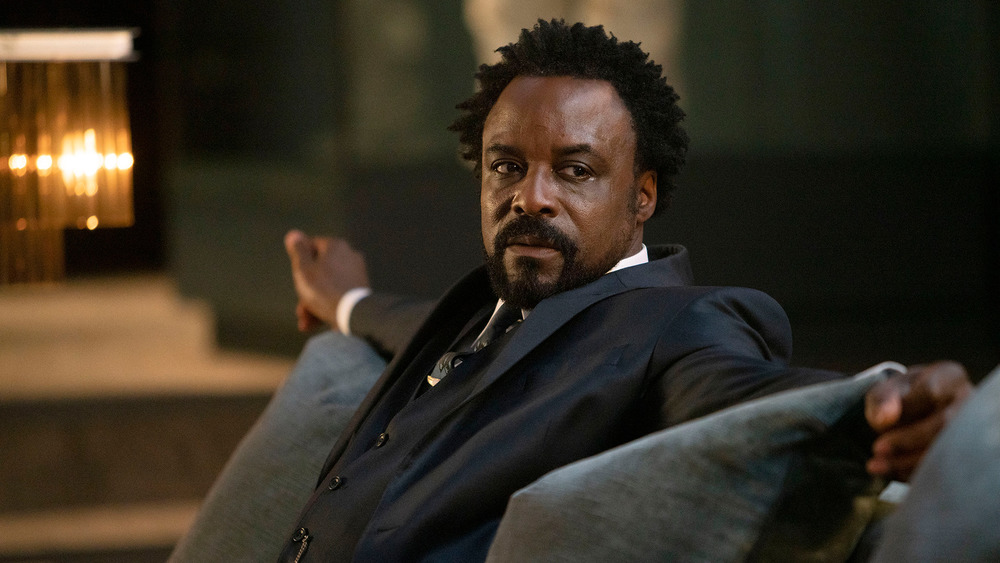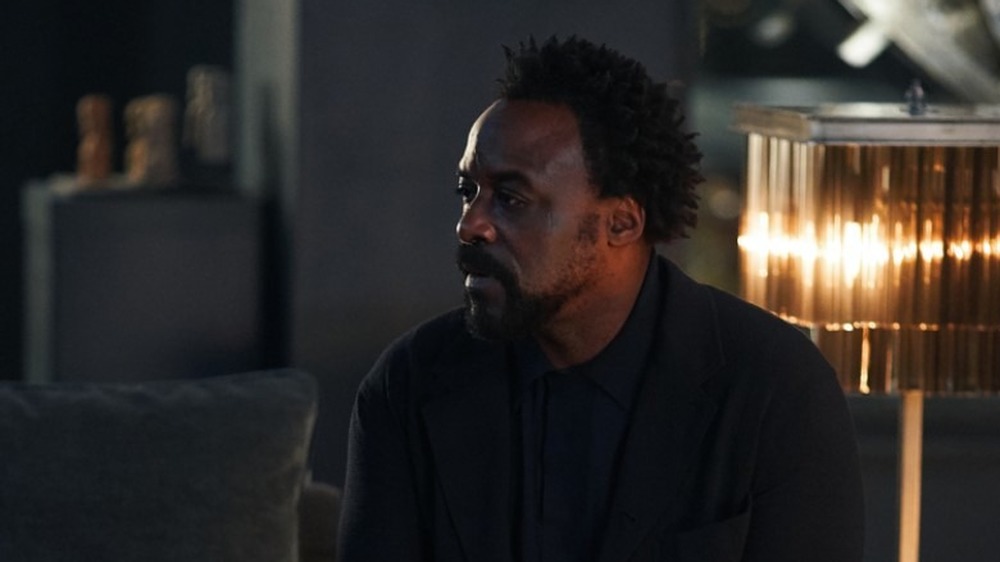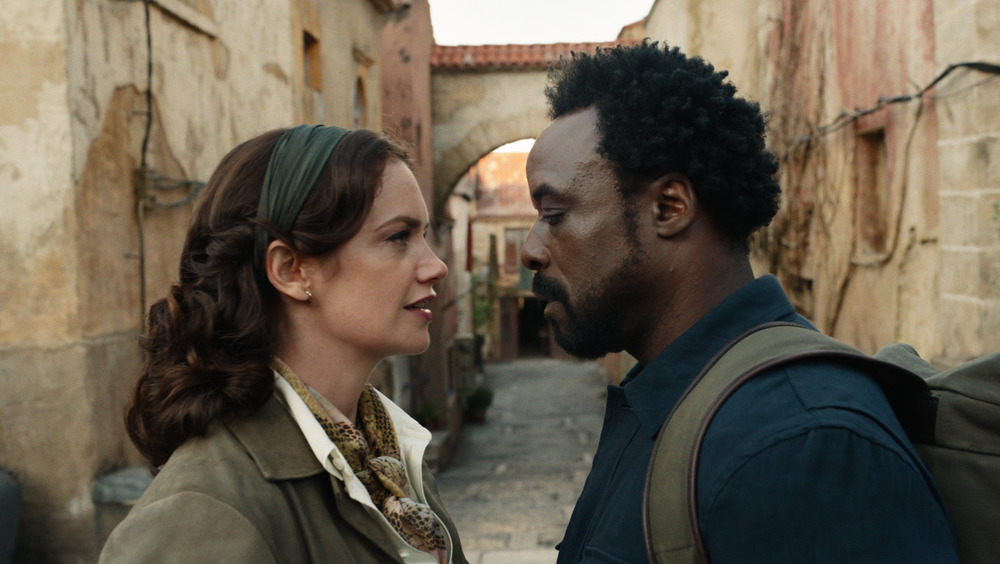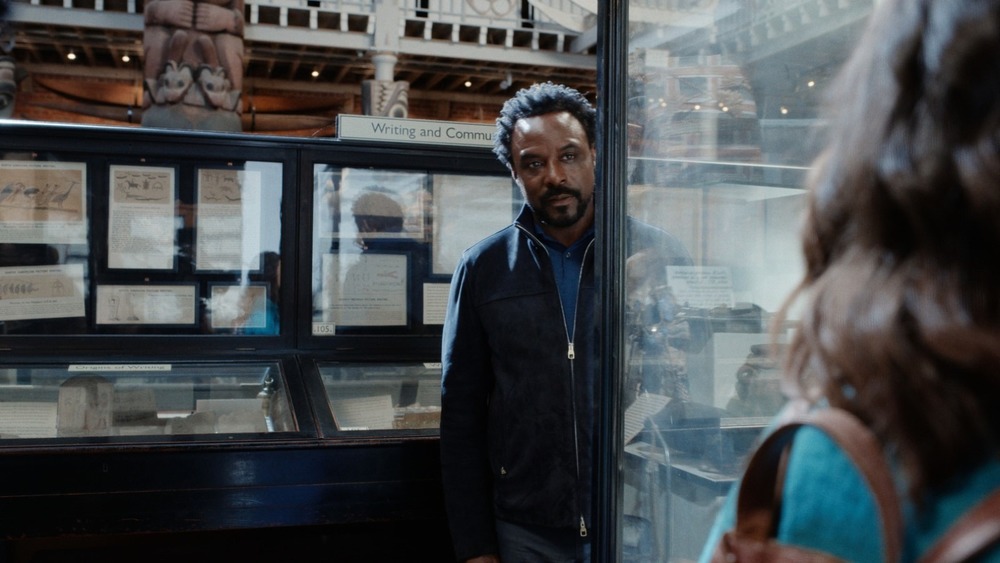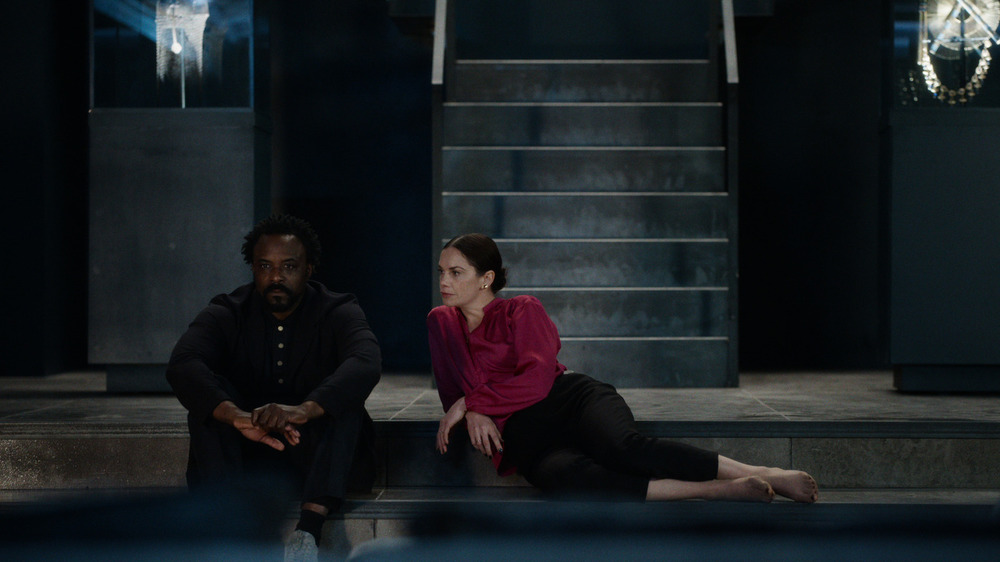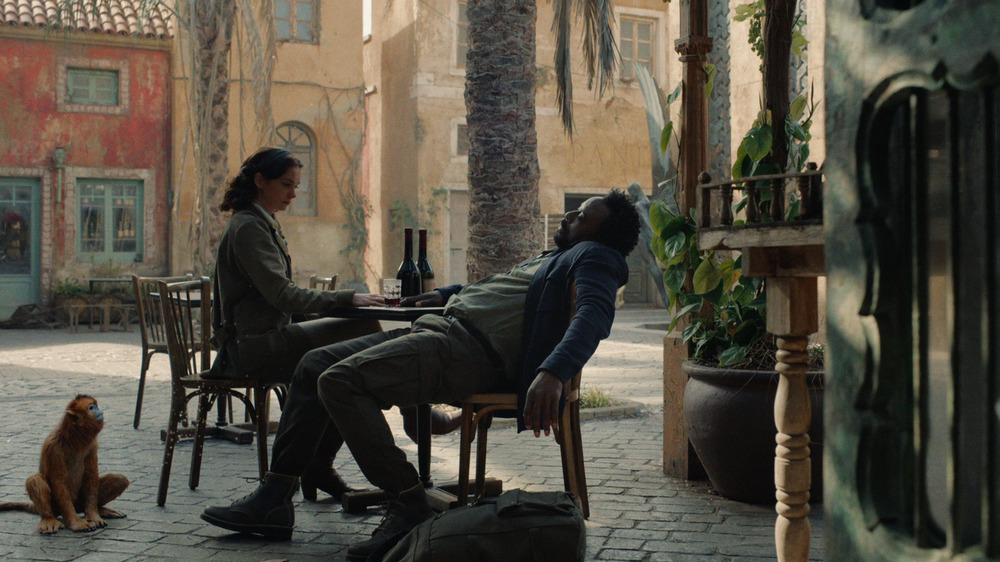Ariyon Bakare Talks His Dark Materials Season 2 - Exclusive Interview
Spoilers for His Dark Materials are included in this article.
When the third and final season of His Dark Materials arrives, there's one character who will be sorely missed — at least in the land of the living. That would be the sly and slithery two-faced scoundrel Lord Carlo Boreal, who is also known to some as Charles Litrom, depending on which parallel dimension you meet him in.
The power-hungry Boreal bit the dust (pun intended) during the second season's penultimate episode, when he was poisoned by a far more treacherous wretch, the cunning Mrs. Coulter (Ruth Wilson). While His Dark Materials already teased the Land of the Dead afterlife with the deceased Roger Parslow (Lewin Lloyd) making a return during the season 2 finale's post-credits scene, it's possible Boreal isn't exactly gone for good, but who knows.
Lord Boreal is played by British actor Ariyon Bakare, who seems to have passionate love affair with film projects of the fantastical variety. Take a look at his IMDb and you'll see what we mean: Life, Carnival Row, Rogue One: A Star Wars Story, Jupiter Ascending, the list goes on. One thing's clear: the man seems to gravitate towards science fiction. And then, of course, there's His Dark Materials, Bakare's latest venture into the realm of sci-fi fantasy.
Looper was curious as to whether or not all of these choices were intentional or just a mere coincidence, so we asked the man himself during an exclusive Zoom chat. Not only did Bakare profess his love of the genre, but he also analyzed and cross-compared himself to Lord Boreal — and he couldn't be any more opposite than his sinister onscreen persona. In fact, Bakare described himself as "quite a fun person," and we can now verify that's true — maybe even a little bit of an understatement. Bakare was all grins and smiles during the conversation, even candidly tackling some of the bigger and more existential questions with ease, and with occasional outbursts of infectious laughter.
Throughout this exclusive interview, he touches on a variety of topics, big and small — of course, he reflects on his time playing Lord Boreal and shares his thoughts on his talented co-star Dafne Keen, who plays Lyra Silvertongue. He also reveals his personal views on science versus theology and tells us what his Daemon (spirit animal) would be if he had one in real life. On a more serious note, he's not only an actor, but he's also an activist. Bakare also weighs in with some poignant words about racism and how he plans to combat that with an organization he founded called iCARE (Conversations About Racial Equality).
Dafne Keen is eloquent, direct, and 'in your face'
We recently spoke with Dafne Keen. She's such a delight to talk to. Do you have any favorite on-set moments with her while working on His Dark Materials?
I just think Dafne Keen and Amir Wilson are two exceptionally young talents who have really come into their own during the course of filming. And Dafne is such a bright young kid. When you talk to her, sometimes you forget you're talking to a child. She's so eloquent and direct and really — she's in your face. We always had a really good connection. And yeah, it was a really good bonding connection. Her and Amir are still really good friends. Her whole family, we still all see and talk to each other all the time.
Would you say she's a lot like her Lyra Silvertongue character?
Yeah, she's as brave, open-minded, and as free as Lyra. I say she is, but there's other sides of her. She's a modern-day woman. And that's what's really cool. You're kind of seeing this young girl you're thinking, "Wow, you really will take on the world." And I can see that in her.
When you first landed the role of Carlo Boreal, were you already familiar with Philip Pullman's trilogy of novels or did you have to dive into them right away to research for the part?
I never read the books. My agent called me up and said, "Oh look, there's this thing called His Dark Materials. They want you to play Boreal." I said, "Okay." And I was up for quite a few projects at the time: Lovecraft Country, Noughts + Crosses. I was down to the last two for like four jobs — one after another. They gave me a five-page scene to learn and I was thinking, "Wow, this is really quite interesting. What is this part that's got daemons? He's quite dark." And then I read the script. I always go with my first instinct. And so, when I first read the scenes, it was like, "Wow, this is creating a physicality in me that I can't lose."
I went off and read the books. I read the first one and went, "Oh my gosh, Carlo Boreal is in one scene. He says nothing. Why is he there?" And then I spoke to the producers and the directors and they assured me that his character would expand in season 2. Then I got offered the part. At the time, I got offered like four different roles, in four different shows, and I had to make a decision. And I really thought about it, "Which one do I think is going to challenge me as an actor?" And I felt this was a role that would challenge me the most. And so I went with this.
Now that you've read the books, how well do you think it's translating to the screen so far?
I think it's amazing. I think this trilogy lends itself to long form rather than a short form. It means you've got more time to tell stories. You've got more time to delve into the characters. You're allowed to go into the backstory. There's a lot more layers. I reckon this could've gone on for eight or nine seasons. Because there's so much depth to it. There's so much detail that you want to get in. And you're still not satisfied because there's so much in Philip Pullman's books, his books are just so rich. There's a rich tapestry of ideas and themes and questions that you just want to keep on asking.
Lord Boreal's ethnic background is never specifically mentioned in the books
In the books, many fans always perceived the character as white. What was your reaction to that when you finally read the books?
In the book, it just said he was grayed-haired and that he wore a hat. I didn't really see the color. When I read a book, my imagination is they all either look like me, or whatever color they want to be. And then really, unless it specifically says, he's a white man — It didn't say that in the book once. It just says he licks his lips a lot, he's got gray hair and wears really shoddy hats. [Laughs] The only thing that was different was the fact that he was a lot older than me. That kind of threw me a bit. And then I thought "Well, no, if I try and bring that character to a modern audience, how would I play it? How would I be in this world? How would young people expect me to be with all the knowledge that they have and all the reference points they have? Where would you place him?" So I kind of stripped away some of the things I felt an older person would do.
In the book, I think he's in his 60s or 70s — big difference. So I was like "Well, okay, I'm not going to be so smiley. I'm going to take away the ingratiated quality of him. I'm going to now make him a bit colder, really go for the archetypal villain. But keep him with a still quality and don't give anything away. Keep all the emotions locked in and contained." And I thought that was a more of a modern take on it.
Is there anything that you feel that you have in common with Carlo Boreal?
I think I probably have his drive. I'm quite the opposite of the character. I'm a smiley, laugh more, I'm quite a fun person. It was hard for me because this is a character who's so divorced of emotion, that I would say every single time I was on set, I always had to contain that. And then as soon as you finish, as soon as they say "cut," I was like, "Yeah, come on, let's play around." [Laughs] Really! And then it'd be back to Boreal who was kind of mean and cool, and kind of James Bond-esque. I guess there's an element of me in every single part I play.
In the world of His Dark Materials, there are Daemons, which are pretty much like spirit animals. Carlo Boreal's Daemon is a snake. If these things existed in real life, what do you think your animal would be?
I think it would probably be a golden eagle. I think it would go from a golden eagle or a black panther. When I was younger, it probably would have been literally constant to see which one it's going to settle into. And it would have been between a golden eagle and a black panther.
There's a battle raging between science and theology in His Dark Materials. That's the basic theme of the show. Ultimately, which side do you stand on between the two?
Now you're asking some questions today, ain't you? [Laughs] Look, I did a film called Life. And in Life, I remember I was working with a scientist and I did a lot of research on scientists. We had a big conversation about science versus theology. And at the end of the day, even as a scientist, you would always ask — where did it begin? So, I would always have to go back to, it has to be a spiritual thing. I believe in the universe. I believe that the universe creates us, and creates the world, and creates what we do. I believe there's an energy. So, as to your question, I would say I think I'm more theolo-sciencey.
I think I'm more 'theolo-sciencey'
There are such big ideas in this show, from daemons to magic to parallel dimensions and the science versus religion thing we just talked about. When the cameras aren't rolling, does this spark a lot of deep, philosophical conversation between you and your co-stars and the crew? You guys must geek out about this stuff.
There was a geek-out moment between me and Clarke Peters, he played the Master in the first season. We used to travel back and forth together and we'd really geek out on it a lot. And we'd have big kind of existential questions that we'd always want to ask. But after a while, when you work on it every single day, you're worried more about getting your lines in and trying to make sure you hit your character.
This theme about religious authority has popped up in television shows a lot lately. The Handmaid's Tale is about a Theonomic government. HBO Max's Raised by Wolves is a great science fiction show that focuses on that clash between atheists and religion. And in this show, the Magisterium is the villain. Why do you think this topic resonates so well with audiences?
I think right now we're asking these questions, aren't we. We're asking "Why?" We're asking "What's going on?" We're in the middle of a pandemic, as nature's attack on humans. So we're asking questions. Why? Why are we here? What have we done wrong? Is it just science that's caused this? Or is it nature that's caused it? Or is it our disbelief in our own selves?
I think we are longing for that, for those questions to be explored in whichever way. And sci-fi and fantasy allows us to do this, allows us to throw these questions out. Allows us to have these big ideas and see where they land. I think we all have a little bit inside of ourselves. That we're always questioning how we exist in a planet that's continuously evolving, and it has a beginning, middle, and end, but yet it keeps on going. So I think we always ask those questions.
What are some real-world lessons you think people can learn from the show? Because I think the show also makes a commentary on society and oppression. There's a great scene with Dr. Mary Malone and Mrs. Coulter in season 2 when you could see the stark contrast between the two. Because Mrs. Coulter comes from this world where women are oppressed. And there's that scene when you first meet Mary Malone and Lord Boreal says, "I've always admired a woman with a good work ethic."
The most misogynistic line ever in the whole script. I think that you've just answered your own question. The thing is, look how far we've come. Let's not go backwards — that's what I think we can learn from this show. Let's look at all these things and keep thinking how we can make it go forward and be better. And that's in all shapes. That's about sexuality, racism, all these things. Let's see how we move things forward. And we know our children's children probably will not live in a world that we live in. So seeing it through a young girl's eyes, seeing it from two young people's eyes and how they navigate through this landscape and learn the lessons, and try to rid themselves of the inherited ideologies of the past, or ideologies of a world is quite fascinating. So that's what people will learn from it.
Ariyon Bakare is the founder of iCARE—Conversations About Racial Equality
Aside from His Dark Materials, you've also appeared in Life, Rogue One: A Star Wars Story, Carnival Row, and Jupiter Ascending. It seems you're attracted to science fiction and fantasy. Is it safe to assume that this is your favorite genre? Is there a reason why you gravitate toward it so much?
I think it happened by accident. I seem to get cast in that sort of stuff a lot. I've done a lot of natural things, but the things that blow up seem to always be sci-fi or magic. But when I was younger, that's all I was into. I was into fantasy. I geeked out on fantasy. Sci-fi and fantasy was my thing. So maybe that's where I've learned all my acting styles. But yeah, I like it. You get to play these big, massive characters. But that doesn't mean I don't want to do other stuff.
Earlier you mentioned you were up for a role in Lovecraft Country. Can you tell us what part you were actually reading for? Are you allowed to talk about that?
I don't know if I'm allowed to say, I don't know if I'm allowed to say what part I was reading for. But I can say that I definitely, definitely, definitely auditioned for it. But it's not fair to say that for the other actor.
What's your opinion on that show? Did you watch it?
One of my closest friends is in that show. I would say Lovecraft Country was one of the best scripts I ever read. And I was blown away by it. And I'm still blown away by the show itself.
You founded an organization called iCARE — Conversations About Racial Equality. For the people who aren't familiar with it, can you tell us a little bit about why you founded that group and what your ultimate goal is?
I founded iCARE because after watching the footage of George Floyd and Karen Cooper, it affected me quite deeply, because I grew up and lived in the States for a long time. And I think learning my lessons as a Black man in the States, I felt as if there was something that needed to be done about the systematic racism that was happening globally against black people. I felt that we need to come together and have conversations that are honest to demystify racism. So that we then become an army in ourselves that stops racists coming forward. And so, if you joined iCARE, you're saying that if you ever saw a racist incident, you will stand up, speak out and defend. And I think that's an important place for all of us to be.
We have people starting conversations to talk about their experiences, things they want to change, how they would educate people, and how to change the narrative. And how to allow people to have an honest conversation, no matter where you're from. This isn't about being Black or white. It's about being Black, gay, straight, bisexual — I don't care. I think it's about just being human. And at the end of the day, I think that's where we've got to get to. Because there's so many other massive fights that we've got to work on now. We've got to work globally and politically. We've got the things that we ourselves have to take responsibility for. And I think racism should be one of the things that we should absolutely try our best to eradicate. Because it's an irrelevant and illogical state of mind and being.
Ariyon Bakare is a poet
What's next for you? Can you tell us a little bit about what you have going on and what we should look forward to?
I've got to finish Carnival Row. Go back to finish the next season of that. I've just finished filming two films as well. And I'm just going off to do another film. Yeah. I'm waiting for a phone call for another one, please come through! [Laughs] Another sci-fi! [Laughs]
Has this pandemic hindered or killed any projects that you were attached to?
Yeah. It's affected everyone, hasn't it? There have been a couple of projects that I was supposed to be doing this year that have been pushed to next year. It's been a really weird year. This should have been my year. Last year, I did five jobs, one after another. And then I'd get a really big job. This blows up in a big way as well. And you think, "Oh yeah, this is the year." And now it's kind of been like, "Aw, I wish this came out in any other year. It would've been brilliant." But hey, just got to roll with the punches. This will end at some point — hopefully, cross fingers. I really hope it will end. I feel sorry for people in theater a lot.
I'm hoping that there will be an initiative where people support everyone in the theater. I don't know what it's like in America, but over here, all our theaters closed. I'm hoping when this is all over, we step out of our house and we go to the cinemas, and we go to the theaters and we support people who have really suffered in this pandemic. And my fellow actors in theater land, they've really been hit hard. Nearly all our theaters are closed. We can't see movies, can't see a play. And we live off plays. My life is a play. So not to be able to go — that's some people's livelihood just gone overnight. And that's really sad. So I'm hoping when this is all over, we switch off our TVs for a little while and just put all our time to come and see some live performances and support these people once again. And make them feel wanted. That's what I hope. I really do hope that happens.
What do you do when you're actually not working? When you have your free time, do you have any other creative or artistic hobbies?
My main thing is I write poems. I sound like a real idiot. I always think I sound like an idiot when I say this. I like to write a poem. I write a poem in the morning. I'm really sorry. It's my meditation. It's the way I kind of get all the madness in my mind. When I wake up, I just let it out. And it comes out in poetry form. And I take photographs. I'm a big, massive photographer. So if I could, I think at one point, I always thought I'd be on the other side of the camera. Writing and photography, those are the two things, I'd say. And I'm a really good cook. [Laughs]
You can stream both seasons of His Dark Materials on HBO Max.
